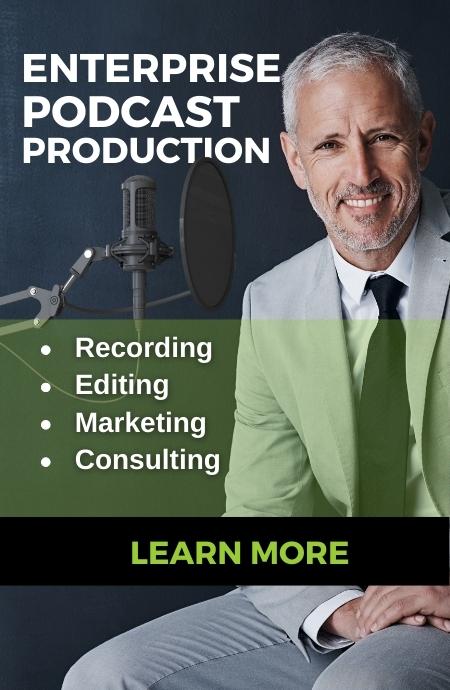Knowing how to promote your podcast is invaluable for its success. It’s important to realize that, even though podcasting is relatively new in the business world, there are over 750,000 podcasts, as of 2019. This means that there are also over 30 million episodes available for podcast listeners to consume.
In terms of ad revenue, podcasts continue to have a meteoric rise. If in 2015, they produced roughly $69 million, in 2018 that figure rose to $402 million. If predictions remain consistent, by 2020, ad revenue is expected to reach around $659 million, and a whopping $1.6 billion by 2022. Percentage-wise, this is a jaw-dropping ad revenue growth of over 2,300% in just 7 years!
Spotify, the Swedish media-services provider, didn’t support podcasts until 2015. And in 2019, it pledged on investing up to $500 million to acquire podcast companies. All of these numbers stand to indicate that podcasts are on their way up, and it would be a mistake not to take advantage. Nevertheless, given their popularity, companies will need a solid promotion strategy if they wish to stand out from their competition. Below are several steps to help you achieve that.
Make Sure You Are on All Major Podcast Directories
It is important to cover all of the bases when planning to distribute your podcast. According to Neiman Lab, 70% of all podcasts listening takes place on iTunes. Having your podcast featured on the platform is a no-brainer if you wish to gain any traction.
Yet, iTunes isn’t the only directory that features podcasts. As mentioned, Spotify is making hefty investments in the market, and so are many others.
As such, you should make it your priority to have your podcast featured on all major podcast directories. At the moment, these include iTunes, Spotify, Google Podcasts, Stitcher, TuneIn, Blubrry, PodBean, CastBox, RadioPublic, iPodder, Audioboom, Soundcloud, and even YouTube, among many others.
Use Proper SEO Tactics
Recently, Google began showing podcast episode results in its Search Engine Results.
This is tremendous news for the search-ability of your podcast content. Even more so, the podcast episodes are playable right on the Search Engine Results Page!
To help Google and other search engines find your podcast you want to be sure that you or your podcast production company implements the proper meta data to foster your SEO.
You should look to optimize both your podcast metadata and podcast page. Here are some tips that will help in this regard:
- Publish a new blog post for every episode – This will allow you to incorporate written SEO tactics for your podcast.
- Use keywords – in the page’s title (H1) and some of the page’s subheadings (H2, H3, H4, etc.). You should also incorporate keywords in the image ALT attributes, the page’s meta description, throughout the content, and in the page’s <TITLE> tag.
- Number your episodes – For easy user navigation.
- Write a catchy episode title and short but comprehensive description.
- Include your podcast’s website link in every episode description.
- Add the embedded metadata in an ID3 format.
Leverage Guests Who Have Followings
A successful podcast will almost always need, among other things, regular guest appearances from experts and thought leaders in your respective industry. Not only will this draw in new listeners on its own, but it also presents a great promotion opportunity. You can leverage these guests’ notoriety by tapping into their followings.
Your guests will naturally want to share their appearance on your show, but you also need to make it easy for them. Provide them with whatever they need, including relevant copy, links, images, video, and audio. Send them an email with all of this content in a prewritten copy with the appropriate links, images, keywords, and hashtags to post on their social media pages.
Promoting Podcasts on Social Media
Using your own social media channels to promote your podcast should go without saying. There are plenty of ways of going about it, too. For example, you can:
- Pin episode tweets or Facebook posts that feature the iTunes URL.
- Create Audiograms (see below) that turn the audio into eye-catching video snippets
- Create 15-second soundbites, upload them on SoundCloud, and share them on Twitter. People can play the audio directly from their Twitter stream.
- Tease an upcoming episode at least one day in advance.
- Take several behind-the-scenes moments and share them as an Instagram story.
- Use paid advertising on social networks to boost your posts and expand your reach.
- Check your analytics regularly and optimize if necessary.
Using Audiograms
Audiograms are another useful tool for podcast promotion on social media. Basically, an audiogram is a static image that’s converted into a video by placing audio, a waveform, and captions over them. Studies have shown that audiograms generated five times more traffic than static images, while also lowering the cost per click from $0.42 (for static images) to $0.08 (for audiograms).
Here is an example from the the Business of Marketing podcast that was used throughout multiple social channels as content:
Create a Blogroll on Your Website
Though the majority of your audience will likely originate from podcast directories such as iTunes, Spotify, TuneIn, etc., you’ll also need to have your podcast featured on your website. To make it easy for your listeners to access, watch, and share, you will need a blogroll.
Typically in the form of a sidebar, blogrolls will feature a list of all of your podcast episodes in chronological order. People will only have to scroll through the feed and click on the episode they want.
Mention It in Person
Probably the most cost-effective promotion tactic is to simply go out and mention your podcast in person with every chance you get. Bringing it up in conversation can’t hurt, and it’s a great way of drawing attention to it. Industry-related events are a perfect place to talk about your podcast and promote it.
Likewise, you can approach fellow podcasters in your field and ask to guest host in one of their episodes. Booking weekly guests can sometimes prove to be a challenge, and your volunteering will be more than welcome.
Promote on Printed Material and Email Signatures
If you are already involved in a direct mail advertising campaign or are hosting an event that requires leaflets, you can also promote your podcast on that printed material. Somewhat similarly, you can add a link to your podcast on your and your employees’ email signature. This one-time setup will expose your podcast to all the people you come in contact with via email.
Want to learn more? Talk to a professional Content Monsta and start your podcast production journey today!
- The QvQ Content Funnel: Ending the Quality versus Quantity QuestionMarketers often debate whether to prioritize the quality or quantity of content. The QvQ Content Funnel proposes a strategy to balance both, tailoring content type and volume to different sales funnel stages. This method enhances engagement, drives conversions, and builds customer loyalty by delivering the right content at the right time.
- 5 Digital Marketing Content Types That Drive BusinessThere are several digital marketing content types that are sure to …
- Marketing Video Budget – How to secure executive approvalDiscover how to secure executive approval for your video marketing budget. This article teaches you to address the critical concerns of CFOs and CMOs, focusing on efficiency, cost-effectiveness, and ROI. Learn strategies for promoting quick turnarounds, diversifying video content, and implementing remote production. Equip yourself with the tools to present a strategic, results-oriented plan that aligns with your company’s goals and impresses your executives.








